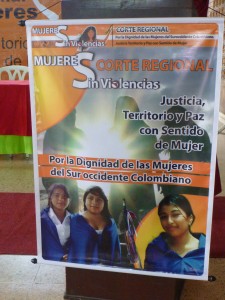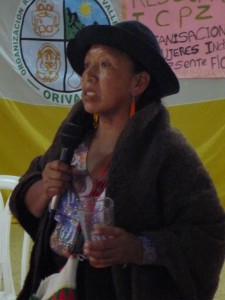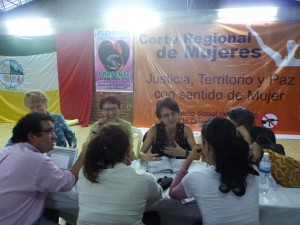Regional Women’s Court in Cali – the importance of Territory
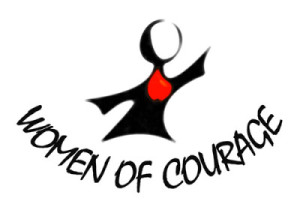
After the women’s court in Bucaramanga, I went on to Cali to participate in the regional women’s court for the region of Cauca. This court had a very strong Indigenous identity and presence, as well as a focus on territory. There was also significant Afro-Colombian participation. The court was organized by five regional and local Indigenous organizations including the (CRIC Regional Indigenous Council of Cauca) in collaboration with the OFP. There were testimonies and representation from municipalities and regions including Cauca Valley, Cauca, Nariño and Huila, as well as Afro-Colombian women and campesino spokeswomen from various social organizations from south-western Colombia. A few of the jury members were the same, but others had been selected from the region. The overall objectives and structure of the Court were the same, but I will write about the differences which were very interesting and significant.
The first difference was that the organizers in Cauca had changed the logo and letterhead for the courts from a militant woman with her right fist raised to an Indigenous woman holding a traditional talking stick.
The focus was very much on territory, where territory was defined as the expansive and sacred space which encompasses nature (Madre Tierra), human beings and all the relations between and among them. Territory then was not simply land; it was Creation. A fundamental premise in the testimonies and discussions about violence against women was that women’s bodies were the first sacred territory and therefore any violence against them was sacrilege. The central connection between women, their bodies and territory was integral to understanding violence against women in all its forms as well to understanding that women suffer all forms of violence against territory. One woman who testified about the murder of her son said, “I am territory, my children are therefore territory because they are my blood”.Violence against women was described as creating disequilibrium in territory and community which results in a breakdown of right relations within territory causing social unrest, further violence and suffering.
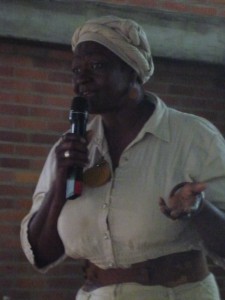
An AfroColombian woman appeals to AfroColombian, Indigenous and campesino communities to work together
Again words are inadequate to describe what we heard, but they are all I have. We heard testimonies about the impact on the lives of women of mining exploitation, environmental damage and contamination, fumigations, bombings, militarization and displacement, and how these impacts break the connections and harmony with Mother Nature and thereby constitute violence against women. We heard about the impact of militarization on the lives and bodies of Indigenous and AfroColombian women and about the different strategies the military uses to occupy Indigenous territory. We heard about the impact of military conflict and violence including displacement, death, persecution and fear. We also heard how security forces use social programs, health, education and infrastructure to establish presence and to occupy Indigenous communities, violating the humanitarian law of distinction between civilian and military programs. We heard about the insidious and devastating practice of the military and armed actors luring Indigenous women with romance as a way of entering Indigenous territory. “We are victims of a war that is not ours,” one woman said.After hearing devastating testimonies about displacement, military violence, sexual violence, racism and impunity and the resulting disequilibrium within territory, community and family, one of the jury members asked about reparations. “As Indigenous women, we don’t talk about reparations,” responded a witness. “You can repair a broken car, but how can you possibly repair what has been done to us. We prefer to talk about recuperation or restitution of our rights and right relations within our territory. This is a long term process. It may take another 500 years, but that is what we are working for.” She concluded by saying, “We must unlearn a whole history of colonization and militarization.”
As the jury we were again faced with the impossible task of summarizing what we had heard in a final verdict which was delivered the following day. We tried to reflect the testimonies as well as the important messages about the relationships between Indigenous women, territory and violence. This verdict is also posted on the blog. This verdict is an important tool for us,” said one woman after it was delivered. “We need to show that this is not only our struggle, but the struggle of all Colombians and the international community”. We ended the verdict with the following commitment.We encourage all women to continue in their just struggle for life, land, and dignity and we declare our commitment to follow up on this decision, conveying it to all corners of the world
